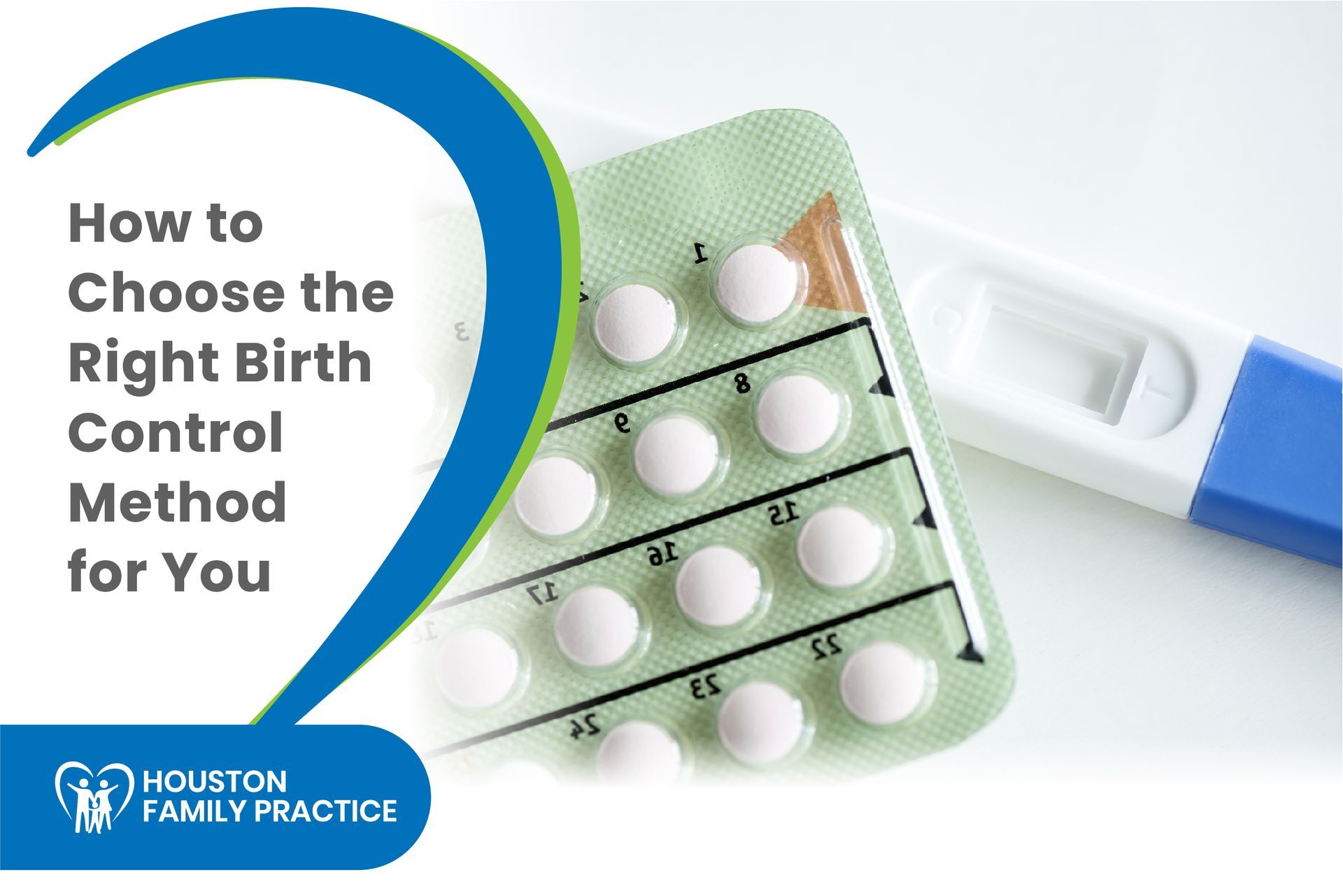Choosing the right birth control is an important choice that significantly affects your life and health. It isn't simply about preventing pregnancy; it's about taking control of your reproductive health, improving your hormone levels, or honoring your values. We recognize the significance of this decision and the emotions it may evoke. Whether you're seeking a method that aligns with your cultural heritage, supports your religious beliefs, or simply resonates with your personal preferences, we're here to support you every step of the way.
This article will discuss the different birth control options, delving into their features, benefits, and potential considerations. Our goal is to equip you with the knowledge to make informed choices, considering the unique aspects of your identity and the diverse tapestry of your life.
So, let's dig into how to select the best birth control method for you and take a step toward empowering yourself to manage your reproductive health.
What is Birth Control Method?
All methods of preventing pregnancy are collectively referred to as contraception or
birth control. Various contraceptive options and pregnancy prevention strategies differ in their effectiveness.
Since there are many birth control types, we will discuss further in this article factors you should consider if you have questions such as “Which birth control is right for me?”
The Birth Control Options
A wide range of birth control methods allows you to find the best approach. Types of birth control
include the following:
1. Hormonal Treatments
Most chemical birth control methods work by stopping a woman's ovaries from making an egg every month. In contrast to birth control pills, implants can last up to three years.
Methods that use hormones are:
- Hormonal IUDs
- Implant
- Shot
- Patch
- Ring
- Birth control pills
2. Intrauterine Devices (IUDs)
A doctor puts a small, T-shaped plastic device placed inside a woman's uterus to prevent pregnancy. This intrauterine device (IUD) has successfully prevented pregnancy among the birth control types.
There are two types.
- Copper IUDs release copper to prevent pregnancy
- Hormonal IUDs release hormones to prevent pregnancy
3. Barrier Methods
Barriers work because they stop the sperm from reaching the egg. Some common ways to make a barrier are:
- Condoms for men
- Condoms for women worn in the genital area.
- Birth control diaphragm and cervical cap (placed inside the vagina).
- Sponge for birth control (put in the uterus)
- Spermicide is a gel that stops sperm from reaching the egg. You can use it alone or with a male condom, diaphragm, or cervical cap.
4. Fertility Awareness Methods or Natural Way
If you use Fertility Awareness Methods (FAMs), you can find out when days of the month are best for conceiving. Avoid having intercourse on those days or use another contraception to avoid getting pregnant. Fertility Awareness Methods work best for women who have regular cycles.
5. Sterilization
This is permanent birth control through sterilization. The procedure is as follows:
- Vasectomy is a procedure for males or individuals who produce sperm. The procedure is done by surgically cutting and blocking the spermatic tubes, preventing sperm from entering the semen.
- Tubal ligation, tube cutting or "tying the tubes," is a surgical procedure that closes a woman's (individual with a uterus) fallopian tubes obstructing an egg's access to the uterus for fertilization.
6. Contraception for Emergencies
Emergency contraceptives, also referred to as the "morning-after pill," as used when a birth control method fails, such as when a condom breaks. This method can prevent pregnancy by stopping an egg from being fertilized.
There are two ways to stop pregnancy in an emergency:
- Copper IUD - works up to 5 days after unprotected sex or failed birth control method.
- ECPs Emergency Contraception Pills - recommended to take within 24 hours of unprotected sex or failed birth control method to prevent pregnancy.
Please note: If the egg has already been fertilized and you are pregnant, taking emergency contraception pills won't terminate the pregnancy or hurt the fetus.
How to Choose the Right Birth Control Method for You?
There is no ideal method of contraception, and the plan that best suits your needs could shift over time. So, before settling on a particular type of contraception, here are some
factors you need to consider.
1. How Often Will You Have to Use It?
Lasting and virtually error-proof choices include the
- Implant
- Intrauterine device (IUD)
- Sterilization
IUDs last three to seven years (hormonal) or ten years (copper), and the implant lasts three years. Meanwhile, sterilization lasts forever.
Moreover, all alternative contraception requires more frequent use. Taking the pill daily and changing the patch weekly is the regimen.
A healthcare provider gives birth control shots every three months and swaps or cleans vaginal rings once a month, depending on the version.
You and your partner can use condoms or other barrier methods mentioned every time you have intercourse to prevent sperm from fertilizing the egg.
Fertility Awareness Methods (FAMs), the natural method, incorporates daily temperature checks, cervical mucus checks, and period tracking.
2. The Pregnancy Prevention Effectiveness
The failure rate of any birth control method is the projected percentage of women who fall pregnant within a year of taking it. Sterilization is among the most effective, with a 1% failure rate.
While effective, hormonal techniques require remembering to take a medicine, changing delivery systems (such as the ring or patch), or obtaining a shot, resulting in a 4–7% failure rate. Finally, barrier and fertility-awareness rhythm approaches fail 13–23%.
3. Your Projected Timeframe for Having Children
Planning to start a family shortly? In that scenario, you can utilize a short-term form of birth control.
IUDs, for instance, are highly successful and straightforward, but they require a trip to the doctor for installation and removal. That implies you won't be able to get off them right away.
But getting an IUD will not be worth your time if you want to have children soon. There's no need to consider sterilization if you wish to have more children.
4. Ease of Usage Includes if You’ll Need a Prescription
A doctor's prescription is a requirement for all hormonal contraceptive methods, such as
- Patches
- Tablets (Birth control pills)
- Rings
- Diaphragm
In contrast, IUDs and implants require medical visits. If you consider the ease of using the best contraceptive method, remember sterilization requires surgery.
5. Does Insurance Cover Birth Control?
Your provider determines if insurance covers your selected birth control method. Insurance coverage depends on age, birth control type, and contraceptive brand.
6. Birth Control Containing Hormones and Their Possible Side Effects
Some women worry about hormone side effects. However, hormonal birth control is
harmless for most birthing individuals. The hormones are artificial versions of your body.
7. Any Health Risks for You or Others?
If you have specific preexisting health issues, you should not use certain kinds of hormonal contraception. Consult your doctor if you have a family or personal history of breast cancer, diabetes, or high blood pressure.
There is a possibility that even with careful preparation, a birth control technique will not work. That is why it's important to talk openly with your
healthcare provider about your wants and options for birth control.
Discuss Your Method of Birth Control with Your Doctor
We understand that this is not a one-size-fits-all journey. What works for one person may not work for another. That's why we encourage you to embrace your individuality, ask questions, and engage in conversations with healthcare providers who understand and respect your needs.
Remember, you're not alone on this journey. We're here with you, championing your right to make decisions that reflect your values and contribute to your overall reproductive health. When you look for a "birth control clinic in Houston" or "contraception doctor near me," this will lead you to Houston Family Practice.
Our experienced medical professionals will offer personalized advice and assistance as you select the best form of birth control. You can make an appointment with us immediately and take charge of your contraceptive journey. Your well-being is important to us. Call us at 713-520-6016 or
click the link to schedule an appointment.














